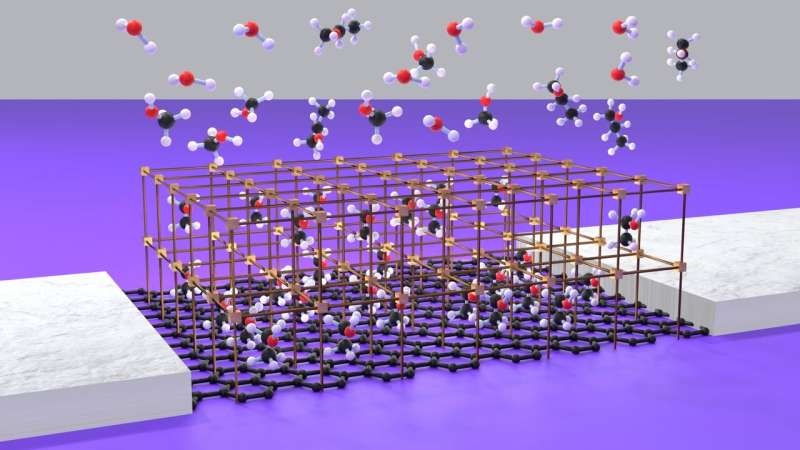Innovative sensor specifically and precisely detects molecules

Researchers of Karlsruhe Institute of Technology (KIT) and Technical University of Darmstadt have developed a novel sensor for gas molecules by combining a graphene transistor with a customized metal-organic coating. The innovative sensor specifically and precisely detects molecules and represents the prototype of an entirely new class of sensors. The ethanol sensor developed responds to neither other alcohols nor humidity. The results are reported in Advanced Materials.
Sensors are omnipresent in vehicles or smartphones, research laboratories and industrial facilities. They capture certain physical or chemical properties, such as pressure, strain, or gas molecules, and transmit the data to processing. Further development of sensors, hence, is of decisive importance to technological progress. Sensors are characterized by their selectivity, i.e. their capacity to detect a certain property in the presence of other, potentially interfering properties, as well as by their sensitivity, i.e. their capacity to measure even low values.
Researchers of KIT and Technical University of Darmstadt have now succeeded in developing a new type of sensor for molecules in the gas phase. The scientists report in Advanced Materials that the functioning principle of this new class of sensors is based on combining sensitive graphene transistors with customized metal-organic coatings. This combination enables selective detection of molecules. As a prototype, the authors present a specific ethanol sensor. Contrary to commercially available sensors, it responds to neither alcohols nor humidity.
Graphene is a modification of carbon with a two-dimensional structure. By nature, it is highly sensitive to foreign molecules that attach to the surface. “However, graphene does not exhibit any molecule-specific interaction that is needed for use as a sensor,” Ralph Krupke says. Krupke is Professor at the Institute of Nanotechnology (INT) of KIT and the Institute of Materials Science of TU Darmstadt. Together with Professor Wolfgang Wenzel (also INT) and Professor Christof Wöll, who heads KIT’s Institute of Functional Interfaces (IFG), he directed the study. First author is Sundeep Kumar, who conducts research at Ralph Krupke’s laboratory at KIT and works on his doctorate in the area of molecular nanostructures at the Institute of Materials Science of TU Darmstadt. “To reach the required selectivity, we have made a metal-organic framework grow on the surface,” Krupke explains.
Sensors can be adjusted precisely
Metal-organic frameworks (MOFs) consist of metallic nodes and organic molecules as connecting rods. By choosing various combinations, these highly porous crystalline materials can be tailored to different applications to reach a selective absorption capacity for certain molecules, for instance. The researchers from Karlsruhe and Darmstadt presented a selective sensor platform by growing a surface-mounted metal-organic framework (SURMOF) directly on a graphene field effect transistor (GFET). Such a component profits from the high sensitivity and simple read-out of a GFET as well as from the high selectivity of a SURMOF.
“Combination of the unique electronic properties of graphene with the high chemical variability of MOFs opens up a great potential,” Christof Wöll says. As various kinds of SURMOFs can be produced and chemical designs of the interface between GFET and SURMOF may vary, work of the researchers opens up an entirely new class of sensors with a specifically adjusted selectivity and sensitivity. “Here, simulation helps,” Wolfgang Wenzel says, “as we can create many MOFs on the computer without having to synthesize them.”
Novel SERS sensor helps to detect aldehyde gases
Sandeep Kumar et al, Sensing Molecules with Metal–Organic Framework Functionalized Graphene Transistors, Advanced Materials (2021). DOI: 10.1002/adma.202103316
Citation:
Innovative sensor specifically and precisely detects molecules (2021, October 5)
retrieved 5 October 2021
from https://phys.org/news/2021-10-sensor-specifically-precisely-molecules.html
This document is subject to copyright. Apart from any fair dealing for the purpose of private study or research, no
part may be reproduced without the written permission. The content is provided for information purposes only.
For all the latest Science News Click Here
For the latest news and updates, follow us on Google News.

